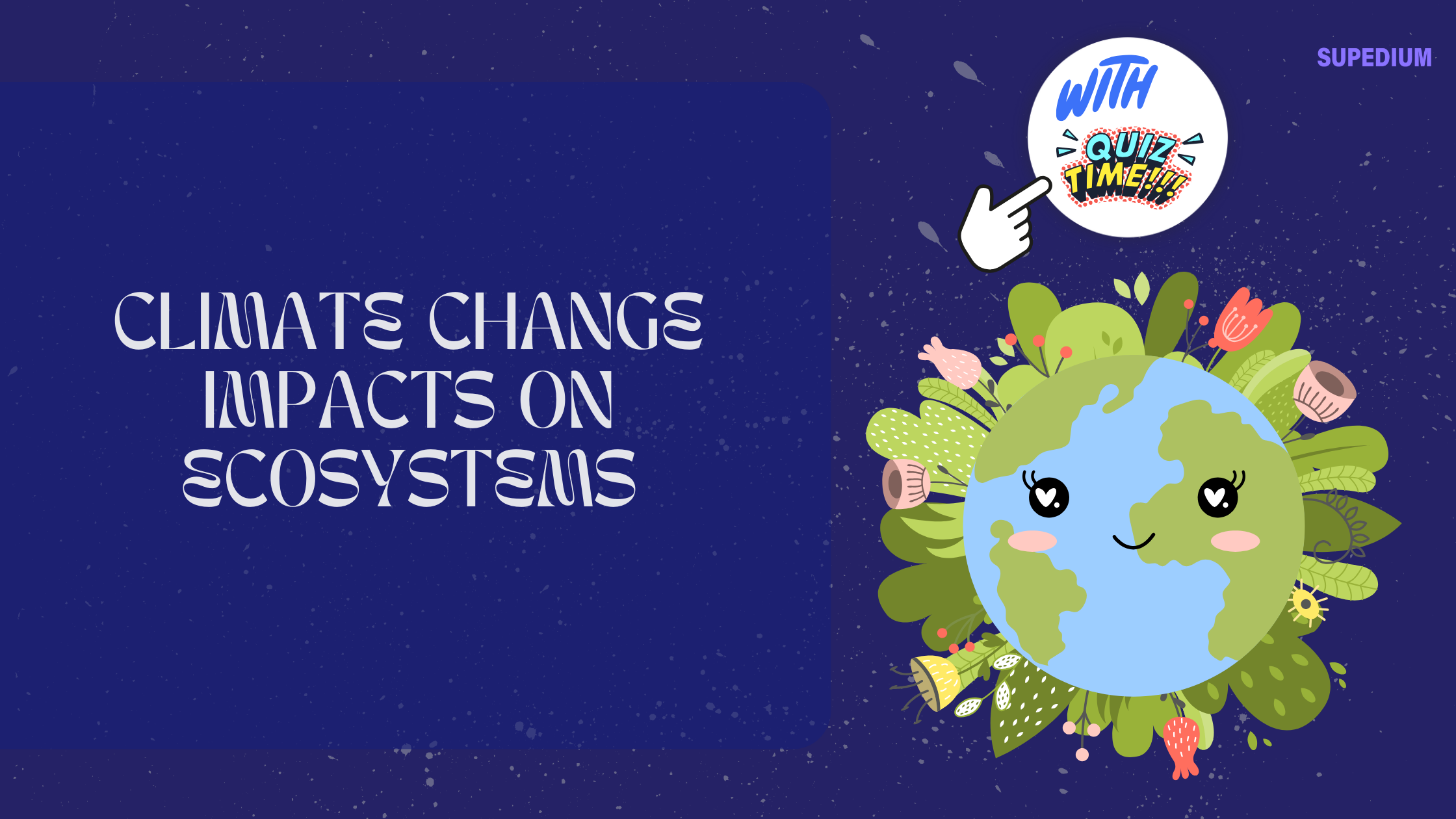Table of Contents
![]()
Climate change represents one of the most significant environmental challenges of our time. It refers to long-term alterations in temperature, precipitation, and other atmospheric conditions, largely driven by human activities such as burning fossil fuels and deforestation. These changes have profound effects on ecosystems—complex networks of living organisms interacting with their physical environment. Understanding these impacts is crucial for developing strategies to mitigate and adapt to climate change.
General Impacts of Climate Change on Ecosystems
Temperature Changes
One of the most direct effects of climate change is the increase in global temperatures. Average global temperatures have risen significantly over the past century, with notable effects on ecosystems. As temperatures climb, species are forced to migrate to cooler areas or higher elevations. For instance, many mountain species are moving up-slope, while those in the Arctic are shifting poleward. This shift can disrupt existing ecological balances, as species interactions and food webs are altered.
Precipitation Changes
Changes in precipitation patterns are another key impact of climate change. Altered rainfall can lead to more intense droughts in some regions and increased flooding in others. These changes affect water availability, which in turn influences plant growth and ecosystem health. For example, prolonged droughts can reduce vegetation cover, leading to soil erosion and loss of habitat for many species. Conversely, excessive rainfall can lead to flooding, which can damage habitats and lead to the spread of diseases.
Extreme Weather Events
The frequency and severity of extreme weather events such as hurricanes, heatwaves, and wildfires have increased due to climate change. These events can have devastating effects on ecosystems. For example, wildfires can destroy vast areas of forest, leading to loss of biodiversity and altered nutrient cycles. Hurricanes can cause extensive damage to coastal ecosystems, including mangroves and coral reefs, disrupting the species that depend on them.
Impacts on Specific Ecosystems
Terrestrial Ecosystems
- Forests
Forests are highly sensitive to climate change. Increased temperatures and altered precipitation patterns can lead to changes in forest composition and structure. For instance, warmer temperatures can increase the prevalence of pests and diseases, which can further stress trees and reduce forest health. Additionally, forests play a crucial role in carbon sequestration; changes in forest cover can affect their ability to absorb carbon dioxide, thereby influencing global climate patterns.
- Grasslands and Savannas
Grasslands and savannas are also affected by climate change. Changes in temperature and precipitation can alter plant species composition, affecting the entire ecosystem. For example, warmer temperatures may favor the growth of certain grasses over others, which can impact herbivore species that rely on specific plants for food. Altered fire regimes, due to changes in temperature and drought, can further affect these ecosystems by altering plant community structure and nutrient cycling.
- Deserts
Deserts are experiencing significant changes due to climate change. Increased temperatures and changing precipitation patterns can exacerbate water scarcity, affecting desert flora and fauna. For instance, some desert plants may struggle to survive in increasingly arid conditions, while others may become more dominant. These changes can disrupt the delicate balance of desert ecosystems and affect species that have adapted to extreme conditions.
Aquatic Ecosystems
- Freshwater Systems
Freshwater ecosystems, including rivers and lakes, are vulnerable to climate change. Rising temperatures can lead to thermal pollution, affecting the health of aquatic species. Changes in precipitation can alter the flow and level of water in rivers and lakes, impacting fish migration and the availability of habitats. Additionally, changes in water temperature and quality can affect the growth and distribution of aquatic plants and algae, with cascading effects on the entire ecosystem.
- Marine Systems
Marine ecosystems are facing significant challenges due to climate change. Ocean warming is leading to coral bleaching, where heat stress causes corals to expel the symbiotic algae they rely on for energy. This phenomenon not only threatens coral reefs but also the myriad species that depend on them. Ocean acidification, caused by increased CO2 levels, is also affecting marine organisms, particularly those with calcium carbonate shells or skeletons, such as shellfish and certain types of plankton.
Coastal Ecosystems
- Mangroves
Mangrove ecosystems are critical for coastal protection and biodiversity. However, rising sea levels and increased storm intensity pose significant threats to these habitats. Mangroves are highly sensitive to changes in sea level and salinity, and their ability to protect coastlines from erosion and storm surges may be compromised as conditions change.
- Salt Marshes and Estuaries
Salt marshes and estuaries are also impacted by climate change. Changes in salinity due to sea level rise and altered precipitation patterns can affect the species that thrive in these environments. Additionally, sediment deposition patterns may shift, impacting the structure and function of these ecosystems. As a result, species that rely on these habitats for breeding, feeding, and shelter may face significant challenges.
Case Studies
Arctic Tundra
The Arctic tundra is experiencing dramatic changes due to climate change. Melting permafrost is releasing stored greenhouse gases and altering soil composition, affecting plant and animal species. Changes in vegetation are impacting herbivore species such as caribou, and shifts in animal migration patterns are disrupting predator-prey relationships.
Great Barrier Reef
The Great Barrier Reef, one of the most iconic marine ecosystems, is facing severe threats from climate change. Coral bleaching events, driven by rising sea temperatures, have led to widespread coral mortality. The loss of coral reefs affects marine biodiversity and the livelihoods of communities that depend on reef-based tourism and fishing.
Amazon Rainforest
The Amazon rainforest is experiencing increased deforestation, exacerbated by climate change. Deforestation reduces the forest’s ability to act as a carbon sink, contributing to further warming. Changes in rainfall patterns and higher temperatures are also affecting the rainforest’s biodiversity, with potential consequences for global climate regulation.
Ecological and Societal Consequences
Loss of Biodiversity
The impacts of climate change on ecosystems contribute to the loss of biodiversity. Species that cannot adapt quickly enough to changing conditions may face extinction, leading to reduced biodiversity and disrupted ecosystem services. This loss can affect ecosystem functions such as pollination, water purification, and nutrient cycling.
Changes in Ecosystem Services
Ecosystem services—benefits that humans derive from ecosystems—are also affected by climate change. Changes in ecosystem health can impact agriculture, water supply, and human health. For instance, altered precipitation patterns can affect crop yields, while changes in water quality can impact drinking water supplies.
Socioeconomic Impacts
Climate change affects not only the environment but also human societies. Indigenous communities and local economies dependent on natural resources may face significant challenges. Changes in land use, shifts in species distributions, and alterations in ecosystem services can have wide-ranging impacts on livelihoods and local economies.
Mitigation and Adaptation Strategies
Conservation Efforts
To address the impacts of climate change, conservation efforts are crucial. Establishing protected areas and restoring degraded habitats can help preserve biodiversity and ecosystem functions. Species management programs can also support the survival of vulnerable species and ecosystems.
Policy and International Agreements
Global agreements such as the Paris Agreement play a key role in addressing climate change. National and local policies that promote conservation, sustainable land use, and emission reductions are essential for mitigating climate change impacts on ecosystems.
Sustainable Practices
Adopting sustainable practices is vital for reducing climate change impacts. Sustainable land and water management practices can help preserve ecosystems, while promoting renewable energy and reducing greenhouse gas emissions can mitigate further climate change.
Conclusion
Climate change has far-reaching impacts on ecosystems, affecting temperature, precipitation patterns, and the frequency of extreme weather events. These changes have significant consequences for both terrestrial and aquatic ecosystems, as well as for biodiversity and human societies. Addressing these impacts requires a combination of conservation efforts, effective policies, and sustainable practices. By understanding and mitigating the effects of climate change, we can help protect the vital ecosystems that support life on Earth.






Be the first to comment